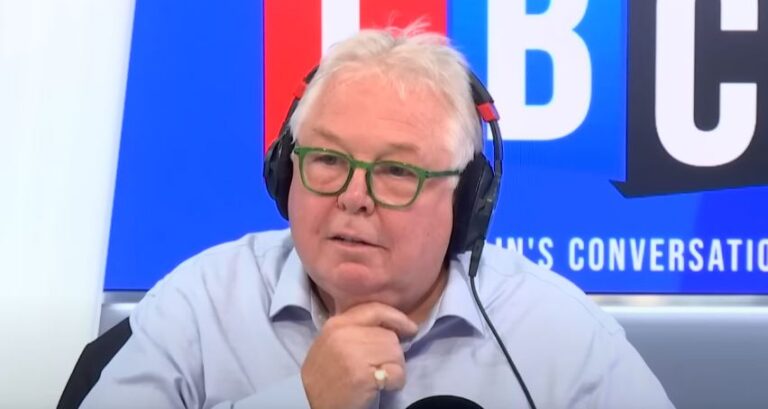Public interest in Nick Ferrari’s estimated salary is still high, particularly as the media sector goes through a financial reassessment. His estimated monthly salary, which hovers around £78,000, reflects a broadcasting career shaped by consistency, versatility, and a notably commanding presence behind the microphone. He has over 40 years of experience and a prominent morning slot on LBC.
Ferrari controls the airwaves during one of radio’s most valuable time slots by hosting LBC’s flagship breakfast show. He covers everything from public services to political fallout in a three-hour window every weekday from 7 to 10 a.m., frequently sparking national discussion. In addition to being captivating, his presence is especially advantageous for advertisers trying to connect with opinionated, active listeners. In a crowded media landscape, this daily impact has turned into his most dependable currency.
Nick Ferrari – Career Background and Salary Overview
| Full Name | Nicolo “Nick” Ferrari |
|---|---|
| Date of Birth | January 31, 1959 |
| Age | 66 years (as of 2025) |
| Nationality | British |
| Profession | Radio Host, TV Presenter, Journalist |
| Education | Eltham College |
| Notable Program | LBC’s Breakfast Show (7am–10am, weekdays) |
| Estimated Monthly Salary | £78,000 (rumored figure) |
| Speculated Per Show Rate | Approximately £2,000 per broadcast |
| Net Worth (2025) | Estimated at $70.4 million |
| Other Income Sources | Sunday Express column, ITV appearances, Sky News, guest panels |
Ferrari’s financial worth serves as an example of how radio hosts have evolved over the last ten years from merely conducting interviews to acting more as influencers. Regularly trending on digital platforms, his commentary occasionally stirs up political controversy—an influence that warrants premium pay. Although Global-owned LBC, a private broadcaster, does not make salary announcements to the public, industry conjecture links his compensation to similar amounts reported by other major stations. According to estimates, each live show costs £2,000, which is comparable to the top commercial talk radio voices.
For comparison, this puts him in the same financial bracket as prominent UK presenters like Piers Morgan and Jeremy Vine, who also handle divisive topics with unreserved candor. Ferrari’s perseverance is what makes his case so special. Since joining LBC in 2001 and assuming permanent control of the breakfast show by 2004, he has developed a style that combines high-impact interviews with listener interaction, frequently attracting the interest of politicians, activists, and decision-makers.
When Ferrari questioned then-Shadow Home Secretary Diane Abbott about police recruitment statistics during the 2017 general election campaign, it was a widely reported moment in his career. The interview, which received extensive media attention, demonstrated his capacity to demand accountability while retaining an audience. The following year, he won the IRN Best Interview award for that performance, which furthered his reputation as a reliable public voice and strengthened his journalistic credibility.
Ferrari writes a regular column for the Sunday Express and regularly appears on ITV’s This Morning, where he offers commentary on a variety of topics, including public policy debates, political tensions, and societal trends, in addition to his daily radio show. His media reach was further increased by his sporadic hosting of Sky News’ The Pledge, and his previous employment with Press TV ended in 2009 when he resigned due to political disagreements, demonstrating his ability to remain professional under duress.
Many people might not be aware that Ferrari had an early career in journalism. His love of storytelling, sparked by his father’s press agency, took him to positions at the Sunday Mirror, The Sun, and News of the World. His editorial instincts were sharpened by those early experiences, which also exposed him to a variety of audiences, ranging from readers of serious news to fans of celebrity gossip.
His income has probably increased over the last 15 years as a result of a combination of salary, appearance fees, and performance bonuses. Ferrari developed a very effective business model by balancing his media engagements across print, television, and radio. His projected 2025 net worth of $70.4 million demonstrates how media personalities can amass wealth via dependability, relatability, and a strong cross-platform presence.
It is remarkably similar to how elite athletes preserve their value through long-term brand association, sponsorships, and guest appearances. Without resorting to gimmicks, Ferrari has profited from his reputation and public recognition in his own field. Sponsors and station owners find his devoted fan base to be very dependable because of his reputation as a tough interviewer who challenges guests while providing listeners with a platform.
Pay transparency debates have heated up recently, especially as concerns about the cost of living have taken center stage in public discourse. Online criticism swiftly emerged after Ferrari raised the question of whether £145,000 a year is “a bad salary” during a contentious NHS debate. The disparity between his reported income and the typical compensation of frontline healthcare workers was immediately brought to light by critics. The incident served as a reminder that public personalities must strike a balance between their own financial success and their social responsibility.
In spite of this, Ferrari’s role is still crucial in a media landscape that is full of opinions but lacking in clarity. He is frequently featured in headline summaries, podcast recaps, and social feeds due to his ability to clearly express important topics, such as government spending, housing affordability, and immigration policy. His employer gains tangible value from this broad relevance, which makes his reported salary not only acceptable but possibly justified.
Ferrari has received many honors during his career, such as the Arqiva Gold Award and the Sony Speech Broadcaster of the Year award. His longstanding status as one of Britain’s most significant media figures is reflected in these accomplishments, which he has attained via years of incisive questioning and steady delivery. In an increasingly fragmented media market, his show’s format—accepting live calls, challenging guests, and striking a balance between news and personality—remains remarkably effective in retaining listeners.
